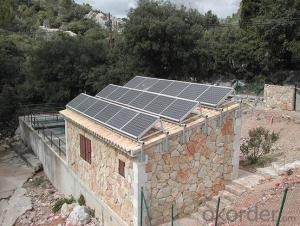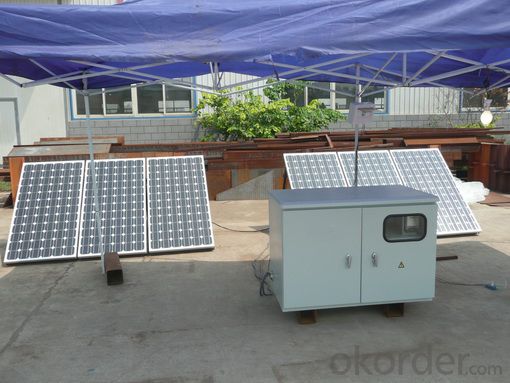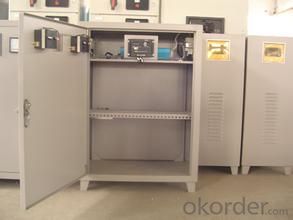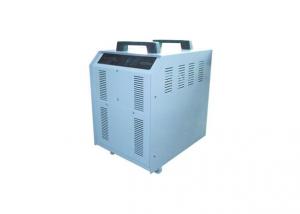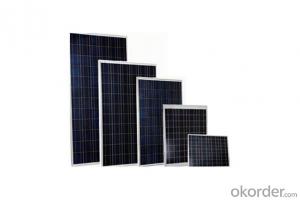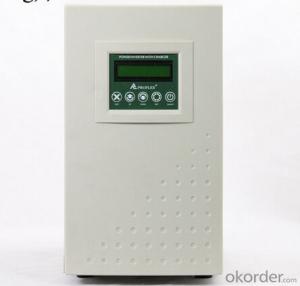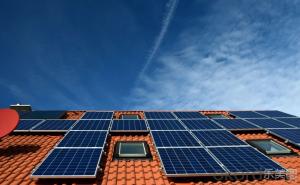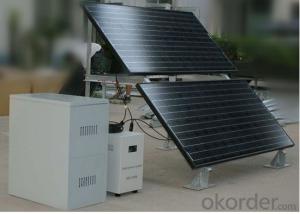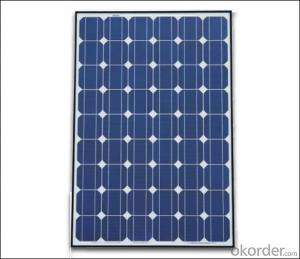Off Grid Solar Energy Systems:Home Off-Grid Power Solutions
- Loading Port:
- Shanghai
- Payment Terms:
- TT or LC
- Min Order Qty:
- 1000 watt
- Supply Capability:
- 200000 watt/month
OKorder Service Pledge
OKorder Financial Service
You Might Also Like
Anern Advantage:
1) Over 10 year experience in clean energy line, business covering solar street light, solar garden light, off grid
solar system and on grid solar power system, etc;
2) Exporting for worldwide, with satisfied clients more than 50 countries;
3) Competitive price, excellent service, integrated certificate system;
Obtain Obvious Advantages, Provide Best Price, Welcome to Talk More.
Solar system advantages:
1. CE, ROHS approved.
2. High conversion efficiency, high-transmission rate.
3. Energy saving, environmental-friendly.
4. Advanced technology, strict quality control system.
5. Easy installation, safe operation, free maintenance.
6. Low MOQ, fast delivery time, long service life.
System Device | |
| No | Device name |
| 1 | solar panels |
| 2 | inverter( off grid and on grid) |
| 3 | mounting system |
| 4 | combiner box |
| 5 | cable and other accessories |
| Quick Details | |||||
| Specification: | Mini | Application: | Home | Output Voltage (V): | 72V |
| Load Power (W): | 3.5-4.2KW | Solar Power (W): | 2KW | Work Time (h): | 4-5days |
| Packaging & Delivery | |
| Packaging Detail: | carton pallet |
| Delivery Detail: | within 7 days |
| Specifications | |||||
| 2KW Solar Power System | |||||
| Lifespan >20 years | |||||
| Designed to meet the needs for low power household appliances | |||||
| Base on your situaion ,we design the solar power system as following : | |||||
| 1: PV-system DC voltage level: DC 48V ,ouput AC voltage level: AC220V 50/60HZ | |||||
| 2: load Working time every day: 840W 5hours(3.5-4.2KW*h/day) | |||||
| 3: Primise rainy days: 2 days | |||||
| 4:PV system power Max Input Power: 2KW/DC72V Max AC Output Power: 2000W AC220V 50/60HZ,opration output power:inductive load <=1KW Resistive load:1.6KW | |||||
| 5: PV Array specification: Voc:DC86.4V Vmp:72V Isc:30A Imp:27.8A |
| Name | Type | Number | Remarks |
| MONO-Solar panel | JX200M/36V 1580*808*35mm | 10 | 2KW connection: 2 Series, 5 In parallel |
| Battery | 12V200Ah | 8 | Gel batteries The total capacity:DC48V/400Ah |
| PV-inverter | JX-2KW | 1 | inputDC48V -outputAC220V 50/60HZ,city power automatic switch |
| PV support | JX-S200-10 | 1 | 10 Pcs solar panels use a PV support , Material: Hot -dip galvanized |
| Battery box | JX-C24 | 1 | size:780*800*900mm 4layerdetachable type |
| PV Controller | CM4860 | 1 | DC48V 60A , RS485 communication function |
| PV cable,connect bettwen | PV-1*4.0mm2 | 100 | PV -specific single-core copper 4.0 mm2 cable,Double protection cover 100M |
| Power cable | BVV-1*16mm2 | 50 | single-core copper 16 mm2 cable,Double protection cover |
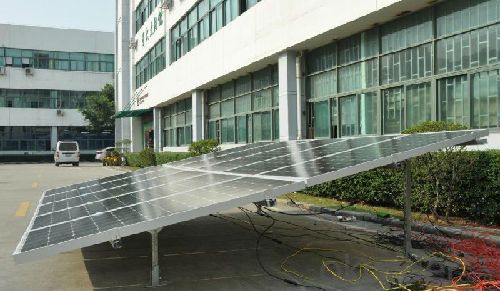
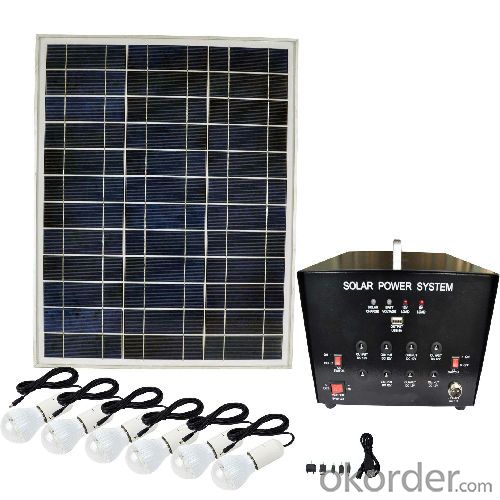
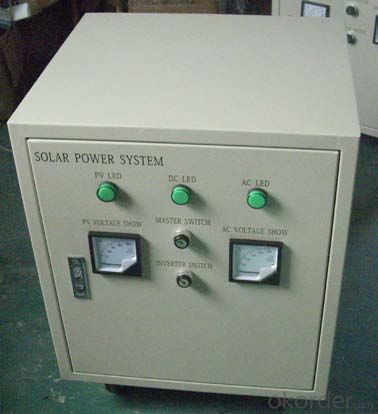
FAQ
1, What’s price per product ?
A: It’s depends on the quantity, delivery date and payment terms of the order. We can talk further about the detail price issue. Our products is high quality with lower price level.
2, How to make payment?
We accept T/T or L/C.
3, What is your lead time?
Generally 1-5 weeks depends on the order quantity and your specific requirements.
4, Can you do OEM for us?
Yes, we can.
5, How do you pack your products?
We have rich experience on how to pack the panels to make sure the safety on shipment when it arrives at the destination.
- Q: Can solar energy systems be used in residential buildings?
- Yes, solar energy systems can be used in residential buildings. In fact, they are increasingly popular as a sustainable and cost-effective alternative to traditional energy sources. These systems can generate electricity to power the household, heat water, and provide heating or cooling, reducing dependence on fossil fuels and lowering utility bills. Additionally, government incentives and the declining cost of solar technology have made it more accessible for homeowners to install solar panels on their roofs.
- Q: How does the quality of solar panels vary across different manufacturers?
- The quality of solar panels can vary greatly depending on the manufacturer chosen. Numerous factors contribute to this variation. To begin with, the materials utilized during the manufacturing process have a significant impact on panel quality. Some manufacturers may opt for cheaper materials that degrade over time or have lower efficiency, while others may choose high-quality materials that ensure durability and optimal performance. The type and quality of photovoltaic cells used in the panels can also differ, affecting their conversion efficiency and overall power output. Furthermore, the manufacturing processes and technologies employed by different manufacturers can influence the quality of solar panels. Companies that invest in advanced production techniques and implement stringent quality control measures are more likely to produce panels with superior workmanship and reliability. Conversely, manufacturers with inadequate manufacturing processes may produce panels that are more prone to defects, malfunctions, or premature degradation. The level of research and development undertaken by manufacturers also plays a significant role in panel quality. Companies that invest in research and development are often at the forefront of technological advancements, resulting in panels with higher efficiency, better durability, and improved performance. In contrast, manufacturers that lack investment in R&D may offer panels with outdated technology or lower reliability. Additionally, the reputation and track record of a manufacturer can provide valuable insights into the quality of their solar panels. Established manufacturers with a long history of producing reliable and high-performance panels are generally more trustworthy than new or unfamiliar companies. Independent certifications and third-party testing can also help assess the quality of panels, as they provide an unbiased evaluation of their performance, durability, and adherence to industry standards. Consumers should conduct thorough research and comparisons among different manufacturers before investing in solar panels. Factors such as materials, manufacturing processes, research and development investments, reputation, and certifications should all be taken into consideration to determine the quality and long-term reliability of the panels.
- Q: Can solar energy systems be used in powering agricultural irrigation systems?
- Yes, solar energy systems can definitely be used to power agricultural irrigation systems. In fact, solar energy is becoming increasingly popular in the agricultural sector as it offers several benefits. Firstly, solar energy is a clean and renewable source of power, which means it helps reduce greenhouse gas emissions and mitigates climate change. This is especially important in the agricultural sector, where traditional power sources like diesel generators can contribute to air pollution. Secondly, solar energy systems can be easily installed and maintained. They typically consist of solar panels, an inverter, and a battery storage system. These components can be placed on rooftops, open fields, or even on solar trackers to maximize sun exposure. Once installed, solar energy systems require minimal maintenance, reducing operational costs for farmers. Furthermore, solar energy systems are particularly well-suited for powering agricultural irrigation systems. Irrigation systems often require a constant and reliable energy source to pump water from wells, rivers, or reservoirs to the fields. Solar energy can provide this consistent power supply, especially in sunny areas where irrigation needs are high. Additionally, solar energy systems can be combined with energy storage solutions such as batteries. This allows farmers to store excess energy generated during the day and use it during periods of low sunlight or at night, ensuring uninterrupted power supply for irrigation systems. Moreover, solar-powered irrigation systems can be more cost-effective in the long run. While the initial investment for installing solar panels and associated equipment may be higher compared to traditional power sources, the operational costs are significantly lower. Once the solar energy system is installed, the farmer can benefit from free energy from the sun, reducing reliance on expensive fossil fuels or grid electricity. In conclusion, solar energy systems are a viable and sustainable option for powering agricultural irrigation systems. They offer environmental benefits, are easy to install and maintain, and can provide a reliable and cost-effective energy supply for farmers.
- Q: What is the role of power purchase agreements in solar energy deployment?
- Power purchase agreements (PPAs) play a crucial role in accelerating the deployment of solar energy. PPAs are contracts between solar developers and electricity buyers, typically utilities or corporations, in which the developer agrees to sell electricity generated from solar installations to the buyer at a predetermined price over a specified period of time. One of the primary benefits of PPAs in solar energy deployment is their ability to mitigate financial risks for both the developer and the buyer. Solar projects often require significant upfront investments, and PPAs help developers secure long-term revenue streams, making it easier to secure financing for the project. On the other hand, buyers benefit from the stable and predictable electricity prices offered by PPAs, reducing their exposure to volatile fossil fuel prices. Furthermore, PPAs provide a mechanism for scaling up solar installations. By entering into long-term contracts, developers can secure a steady income, enabling them to build more solar projects and expand their capacity. This not only increases the overall deployment of solar energy but also helps drive down the costs associated with solar installations due to economies of scale. PPAs also offer flexibility and accessibility. They can be structured in various ways, catering to the unique needs of different parties involved. For instance, a utility may opt for a utility-scale PPA, allowing them to procure a large amount of solar energy to meet their renewable energy targets. On the other hand, a corporation may choose to enter into a distributed PPA, installing solar panels on their own premises and benefiting from reduced electricity costs and a positive sustainability image. Additionally, PPAs contribute to the overall stability and grid integration of solar energy. By signing long-term agreements, solar developers provide a reliable and predictable source of electricity to the grid, assisting utilities in their planning and management of the grid. This helps to balance the intermittency of solar energy and ensures a smooth integration of renewable sources into the existing energy infrastructure. In conclusion, power purchase agreements are vital tools in driving the deployment of solar energy. By reducing financial risks, promoting scalability, offering flexibility, and contributing to grid stability, PPAs incentivize the development and adoption of solar installations, ultimately accelerating the transition towards a cleaner and more sustainable energy future.
- Q: What is the impact of roof pitch on the performance of solar panels?
- The roof pitch, or the angle at which a roof is sloped, has a significant impact on the performance of solar panels. The ideal roof pitch for solar panels depends on various factors, including the geographical location and the desired energy output. One of the primary impacts of roof pitch on solar panel performance is the amount of sunlight that panels receive. The angle of the roof determines how directly sunlight hits the panels. In general, a steeper roof pitch allows for better solar panel performance as it maximizes the sun exposure throughout the day. This is particularly important in areas with lower solar irradiance or during seasons with shorter daylight hours. Another important consideration is the self-cleaning effect of roof pitch. A steeper roof angle facilitates the natural cleaning of solar panels by rainwater, reducing the accumulation of dust, dirt, and debris. This helps maintain the efficiency of the panels over time, as a cleaner surface allows for better light absorption. Furthermore, the roof pitch affects the efficiency of snow shedding. In regions with heavy snowfall, a steeper roof pitch allows snow to slide off more easily, preventing snow accumulation on the panels and ensuring their functionality during winter months. However, it is worth noting that the impact of roof pitch on solar panel performance is not linear. While a steeper roof pitch may offer advantages, there is an optimal angle that maximizes energy production based on the specific latitude of the installation site. This is typically calculated by considering factors such as the sun's angle of incidence and the time of year. In conclusion, the roof pitch plays a crucial role in the performance of solar panels by influencing the amount of sunlight received, facilitating self-cleaning, and aiding snow shedding. Selecting the appropriate roof pitch based on geographic location and energy goals is essential to optimize the efficiency and effectiveness of solar panel installations.
- Q: Can a solar energy system be connected to the grid?
- Yes, a solar energy system can be connected to the grid. In fact, grid-connected solar systems are quite common and allow for excess electricity generated by the solar panels to be fed back into the grid, earning credits or payments through net metering programs. This helps in reducing reliance on traditional energy sources and contributes to the overall stability and sustainability of the grid.
- Q: Can solar energy systems be used in areas with heavy snowfall?
- Yes, solar energy systems can be used in areas with heavy snowfall. While snow can temporarily reduce the efficiency of solar panels, modern systems are designed to withstand and continue producing electricity in harsh weather conditions. Additionally, the angle at which the panels are installed can be optimized to allow snow to slide off easily. Regular maintenance, such as removing snow accumulation, can help maximize their performance in snowy regions.
- Q: Can solar energy systems be used in areas with frequent hurricanes?
- Yes, solar energy systems can be used in areas with frequent hurricanes. While it is true that hurricanes can cause damage to solar panels and other components of solar energy systems, there are measures that can be taken to mitigate these risks. Firstly, the design and installation of solar energy systems in hurricane-prone areas can be done to withstand high winds. This includes using stronger mounting systems, reinforced frames, and secure anchoring techniques. Additionally, the orientation and tilt angle of the panels can be optimized to minimize wind resistance. Furthermore, regular maintenance and inspections can help identify any potential issues or damage to the system before a hurricane hits. This allows for timely repairs or replacements, ensuring the system remains functional and safe during extreme weather events. In the event of a hurricane, it is important to have emergency procedures in place to secure the solar panels and other components. This can involve temporarily removing the panels and securing them indoors or utilizing protective covers to shield them from debris. Moreover, the use of microinverters or power optimizers in solar energy systems can enhance their resilience in hurricane-prone areas. These technologies allow each solar panel to operate independently, mitigating the impact of any damage to a single panel and preventing the entire system from shutting down. Lastly, solar energy systems can also contribute to the resilience of communities during and after hurricanes. With proper battery storage, solar systems can provide backup power during power outages, allowing essential services to continue operating and providing electricity for critical needs such as lighting, refrigeration, and medical equipment. Overall, while precautions need to be taken to ensure the durability and functionality of solar energy systems in hurricane-prone areas, they can be effectively used to harness clean and renewable energy even in the face of frequent hurricanes.
- Q: Can solar energy systems be used in areas with high levels of poverty?
- Yes, solar energy systems can be used in areas with high levels of poverty. In fact, solar energy is often considered a viable solution for providing affordable and sustainable electricity to underserved communities. Solar power can reduce reliance on traditional energy sources, lower energy costs, and provide a reliable source of electricity even in remote areas. Additionally, solar energy systems can be implemented on a small-scale basis, allowing individuals and communities to gradually adopt this renewable energy source according to their needs and financial capabilities. Overall, solar energy has the potential to greatly benefit areas with high levels of poverty, promoting economic development and improving living conditions.
- Q: What is a solar thermal system?
- A solar thermal system is a technology that harnesses the energy from the sun to heat water or other fluids for various applications, such as domestic hot water, space heating, or even electricity generation. It typically consists of solar collectors, a heat transfer medium, and storage tanks, allowing for the conversion of sunlight into usable thermal energy.
Send your message to us
Off Grid Solar Energy Systems:Home Off-Grid Power Solutions
- Loading Port:
- Shanghai
- Payment Terms:
- TT or LC
- Min Order Qty:
- 1000 watt
- Supply Capability:
- 200000 watt/month
OKorder Service Pledge
OKorder Financial Service
Similar products
Hot products
Hot Searches
Related keywords
